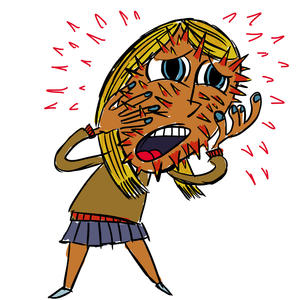Managing acne can be a difficult experience. There are a multitude of products on the market, promising clear skin and a pimple free complexion. Having recently opened the doors to our skin clinic, it seemed appropriate to discuss one of the most commonly talked about topics surrounding this problem: What do I use on my face?
Before answering that question, it makes sense to get a general grasp of what acne is, what causes it and what makes it worse. There are two aspects to this.
The first is an excess production of sebum (the oil) and keratin (skin cells) within the hair follicles. The overproduction of skin cells creates a plug within the hair follicle, trapping the oil within, along with any other debris and forming a pimple. The key to stopping this is ensuring that the excess oils and cells are removed in time to prevent the plug, being rinsed instead from your face with your cleansing routine. To combat this, many people select an aggressive cleanser, one that strips the skin, leaving it feeling clean initially but can worsen the problem long term. After being stripped of its natural oils, your skins immediate reaction is to begin producing more oil to compensate, thus perpetuating the problem. The same can be said of exfoliants. Scratching the surface of the skin will encourage dead cells to be removed too early, causing your skin to produce more in an attempt to create a protective barrier.
The best way to cleanse the skin, is to use a gentle cleanser, one that gently teases dirt and dead cells from the follicles without damaging the living cells beneath. Cleansing Cream had been designed especially for this purpose. It contains ground almonds, which are pressed and rolled along the skin – NOT scrubbed! – to coax dirt out. If you have been using an aggressive chemical cleanser or harsh exfoliator, then Cleansing Cream is certainly the product to swap to. It will give your skin a break from being over cleansed and stop discourage overproduction of dead cells and oil.
The other factor affecting acne is the pH of the skin. The bacteria P. acnes live within the follicles, secreting enzymes to digest the sebum, which acts as a source of food for the bacteria. While this bacteria is not necessarily problematic, if it is allowed to multiply then the enzymes secreted within the follicles can cause damage to the cell walls. Damage leads to inflammation and inflammation leads to those angry red spots that feel sore to touch. So how can we discourage an excess growth of these unfriendly bacteria upon the skin? We reduce the pH!
Our favourite soap free cleanser for this job, is Salcura Antiac Spray It has been designed to help clear flare ups of acne, without the use of soaps to provide a more optimum pH for the skin. This should assist in discouraging the growth of a more healthy skin flora. Sea buckthorn is a key ingredient of Antiac and has the ability to reduce inflammation from the follicles and repair and sooth the damaged cells. If your acne is red and angry, this is certainly the cleanser to choose!
Once you have chosen a cleanser that is right for you, consider the moisturizers that you are applying on a daily basis. Avoid night creams that suffocate the skin, suppressing its natural repair processes while you sleep. Although it may sound counter intuitive, applying an oil to the skin during the evenings can discourage excess sebum production, since the skin does not feel stripped of its natural oils. Skin that is prone to acne has been found to often be deficient in omega 6 upon the surface, therefore restoring the omega 6 oil can be a sucessful topical treatment. Normalizing Day Oil and Divine Face Oil> would be excellent naturally sourced options. If you would like to try something for a short space of time to see if this would work for you, then our own Omega Balance Oil has been designed by us specifically for that purpose.
As a final tip, try adding a drop or two of lavender essential oil to your rinse water. It’s antibacterial and antiseptic properties are a great way to add a little soothing care to your daily regime. If you have any questions or tips of your own, please share them with us below or Contact Us as we would love to hear from you.

